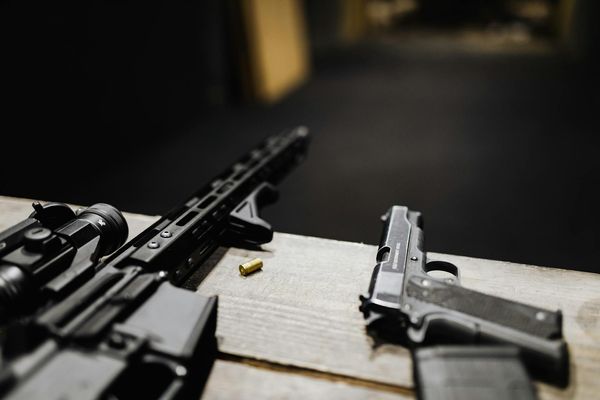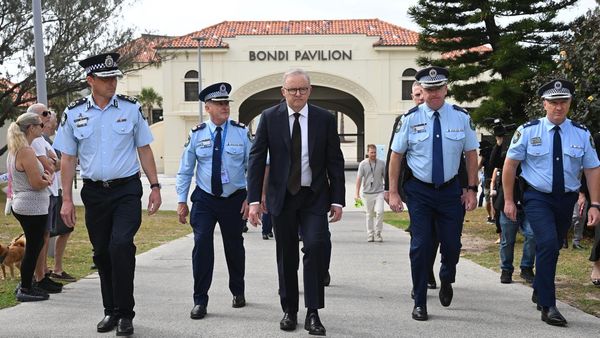
There’s an extra, unexpected shiver of contemporary relevance and horror in this rerelease of Joseph Losey’s brutal expressionist drama from 1964. Tom Courtenay plays the pinch-faced, talkative but also somehow inscrutable Private Hamp, who is court-martialled for desertion in 1917 having “gone for a walk” away from the guns at Passchendaele.
Dirk Bogarde’s suave, sorrowing Capt Charles Hargreaves is assigned the task of defending Private Hamp – suppressing his distaste for Hamp, of course, like all the officer class, and trying not to think about the inevitability of his execution – and he boldly asks the court to consider Hamp’s “mental health”. The presiding colonel, played by Peter Copley, erupts with contempt at this modern-sounding phrase. “Do you mean the prisoner is a lunatic?” The answer is of course no. The idea of struggling with your mental health has a real significance for us now, although the defendant himself is utterly unaware of the issue and is quite incapable even of attempting to capitalise on it.
Adapted from John Wilson’s stage-play Hamp which was in turn taken from James Hodson’s novel Return to the Wood, King and Country is a gruelling story of wartime Britain: the first world war and the class war. The actors that Losey cast were themselves from that tradition of gentlemen and players, officers and other ranks. Like Kubrick’s Paths of Glory from 1957, it focuses on execution for cowardice as the very epitome of war’s cruelty and futility. Bogarde’s Hargreaves is decent and liberal enough, but much preferring that Hamp could have somehow avoided all this fuss and stuck to his role as cannon fodder; Barry Foster is the amiably good-natured Lieutenant Webb; and James Villers is the silkily contemptuous prosecuting officer Captain Midgley. All appear to be coldly at odds during the trial – but afterwards in the officers’ section of the dugout they are as cordial as if in an Oxbridge common room. Leo McKern’s blustering medical officer Captain O’Sullivan, who can think of nothing for terrified soldiers other than to prescribe laxatives, is not quite of their society. Meanwhile, the ordinary soldiers who are going to have to execute Hamp in a few hours are getting very drunk and pretending to put a rat on trial for biting one of them. (One is played by David Cook, the actor and novelist.)
Poor, clueless Hamp is unforgettably played by Courtenay, insouciantly telling Hargreaves how he volunteered in 1914 at the insistence of his wife and mother, but how his wife is now carrying on with another man. Hargreaves of course wants to make this the backbone of his defence, but Hamp does not seem to be that upset now, or by the near-death experience which was another trigger for his escape attempt. Hargreaves is clearly trying to decide what he thinks about Hamp’s strange, almost childlike candour, combined with vagueness about what exactly he felt and when. Is it an act? Dumb insolence? Or is this simply what later generations would think of as catch-22? Of course he is mad. The whole war is mad. Madness might be an extenuating circumstance for Hamp or even an argument for acquittal, but it is also the sole criterion for carrying on with war at all.
Losey creates a stark monochrome nightmare of all this and disturbingly uses still wartime images of the trenches, genuine ones provided by the Imperial War Museum, and also subliminal flashes of photographs to show what Hamp can remember about his civilian life and his state of mind before joining up. We get a glimpse of his house in Islington, London, and of his young son, sentimentally kitted out as for an Edwardian studio photographer, as well as a smug moustachioed fellow who is perhaps his wife’s lover. When he talks about “king and country”, we see an ironic shot of the Kaiser alongside his cousin George V.
There is extra horror for Hamp, and everyone else, in knowing the exact hour of his impending dispatch. The rest of them, though of course under no illusions about the nearness of death, might still comfort themselves in the knowledge that they could escape. Not Hamp. He is aware of his mortality, as no one else is. This film is a gruelling experience and Dirk Bogarde’s coup de grâce is the most horrible effect of all.
• King and Country is released on 6 November on digital platforms, Blu-ray and DVD.







